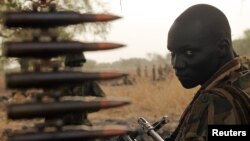LONDON - In South Sudan both the army and rebel groups have imported weapons from overseas and used them in indiscriminate attacks against civilians, according to a report by Amnesty International published on Thursday. Amnesty says the weapons were imported from China, Ukraine, and neighboring Sudan.
Khairunissa Dhala is a researcher on South Sudan at Amnesty International.
“There have been scores of civilians that have been injured and killed and had their properties destroyed due to indiscriminate attacks by South Sudan's armed forces, known as the SPLA, and the armed opposition group South Sudan Liberation Army between 2010 and 2011,” said Dhala.
The report looks at Mayom County in South Sudan’s Unity State, where Amnesty says dozens of people were killed or injured and others were forced to flee their homes.
According to Amnesty, the army used Ukrainian-supplied T-72 battle tanks in indiscriminate attacks against civilians.
The report says the tanks arrived in South Sudan via Kenya and Uganda and that their transfer involved shipping companies from Germany and Ukraine and shell companies registered in Britain and the Isle of Man.
The rebels, it says, used Sudanese-manufactured ammunition and laid Chinese manufactured anti-vehicle mines on the roads.
The countries accused of selling the weapons have not commented on the allegations.
Amnesty’s researcher Dhala says the transfers should never have been made.
"No arms should be transferred where there is a substantial risk of violations of human rights and international humanitarian law, which is the case is South Sudan," said Dhala.
Speaking to VOA, SPLA spokesperson Philip Aguer denies the report's findings. He says South Sudan’s army had not violated human rights in Mayom County.
"SPLA was fighting in self-defense, which is our legitimate role to protect the territories of South Sudan," said Aguer.
Amnesty’s report comes ahead of arms trade negotiations due to start on Monday. The talks, at United Nations headquarters in New York, are aimed at developing a multi-lateral treaty to regulate international arms sales.
Amnesty wants a robust treaty to be put in place, with rules that will stop arms transfers to countries that are likely to use them for serious violations of human rights or war crimes.
Khairunissa Dhala is a researcher on South Sudan at Amnesty International.
“There have been scores of civilians that have been injured and killed and had their properties destroyed due to indiscriminate attacks by South Sudan's armed forces, known as the SPLA, and the armed opposition group South Sudan Liberation Army between 2010 and 2011,” said Dhala.
The report looks at Mayom County in South Sudan’s Unity State, where Amnesty says dozens of people were killed or injured and others were forced to flee their homes.
According to Amnesty, the army used Ukrainian-supplied T-72 battle tanks in indiscriminate attacks against civilians.
The report says the tanks arrived in South Sudan via Kenya and Uganda and that their transfer involved shipping companies from Germany and Ukraine and shell companies registered in Britain and the Isle of Man.
The rebels, it says, used Sudanese-manufactured ammunition and laid Chinese manufactured anti-vehicle mines on the roads.
The countries accused of selling the weapons have not commented on the allegations.
Amnesty’s researcher Dhala says the transfers should never have been made.
"No arms should be transferred where there is a substantial risk of violations of human rights and international humanitarian law, which is the case is South Sudan," said Dhala.
Speaking to VOA, SPLA spokesperson Philip Aguer denies the report's findings. He says South Sudan’s army had not violated human rights in Mayom County.
"SPLA was fighting in self-defense, which is our legitimate role to protect the territories of South Sudan," said Aguer.
Amnesty’s report comes ahead of arms trade negotiations due to start on Monday. The talks, at United Nations headquarters in New York, are aimed at developing a multi-lateral treaty to regulate international arms sales.
Amnesty wants a robust treaty to be put in place, with rules that will stop arms transfers to countries that are likely to use them for serious violations of human rights or war crimes.




